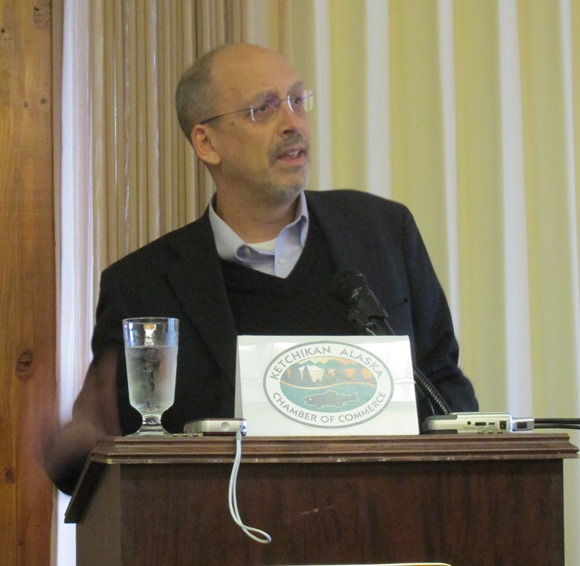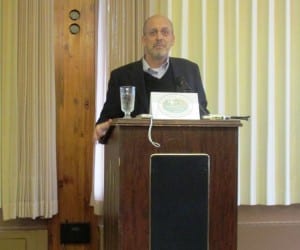Borough Mayor David Landis gave his first State of the Borough address Wednesday to the Greater Ketchikan Chamber of Commerce. He noted that while the state is struggling with drastically reduced revenue from freefalling oil prices, the borough is in good financial shape, and should be able to weather the storm for a while.
Mayor Landis said one likely effect of the state’s revenue shortfall is that more costs will be passed down to local governments. He said borough officials have remained mindful of that possibility, and are prepared.
“The borough has reserves of $7.8 million, which includes a $1.1 million lock-box, is what we’ve called it, for the school funding,” he said. “For their unanticipated costs.”
Landis notes that borough debt is low, and those bonds that are outstanding have been refinanced to take advantage of low interest rates.
He mentioned the education funding lawsuit, which the borough filed about a year ago. In November, Superior Court Judge William Carey ruled in the borough’s favor, agreeing that the state’s required local contribution for public education was unconstitutional.
The state has required boroughs and first-class cities to provide a specific amount to local schools, but that requirement is not applied to other communities in Alaska.
“This is an issue that affects the whole state,” he said. “It’s one that will have repercussions, certainly, but financially, this community will be better off. And all the communities that have borough school districts will be better off, because the cost for schools will be spread over a much larger number of citizens.”
Appeals are likely, so the final outcome of the education funding lawsuit won’t be known for a while. As the case plays out in court, Landis said the Legislature also is expected to address the issue during the upcoming session.
Landis also went over some statistics during his presentation to the Chamber. He noted that the borough’s population has been creeping back since the nearly 600-person drop seen in the 2010 Census. The demographics are different, though, with fewer school-age residents.
Landis said the current unemployment rate in Ketchikan is 6.6 percent, which is slightly above the state average. But there is strong potential for improving that number.
“Visitor count is going to go up next year by 6.3 percent to 940,000 (cruise visitors),” he said. “Ketchikan Shipyard (and the) state signed a $101.5 million contract to build two new ferries. We’re certainly looking forward to an increase in economic activity from those two segments, especially.”
Landis said mining prospects on Prince of Wales Island also have potential economic benefits for the region, but because mineral prices have dropped, the work there has stalled for the time being.
Following his presentation, Landis was asked by an audience member about the potential for consolidating the borough and city governments. Jason Custer said that such a move likely would save the community money, which is more important than ever because of the state’s fiscal crisis.
Landis said it’s a great idea, but it’s up to the citizens to get something started.
“That seems to be a better route for the citizens to say, ‘Hey, we want this to happen,” rather than for the politicians to say, ‘We think this is a great idea. Trust us. We’re from the government,’” he said.
Whether to consolidate is an annual topic, with most people agreeing it would be a good idea. It even has made it onto an election ballot a few times, but in the end, voters rejected each proposition.







